Loud chants echo off of towering office buildings and housing complexes along Santa Clara Street—“Say his name,” “No justice, no peace,” “Black lives matter”—as a few dozen marchers move through downtown San Jose in the warm June air.
Their footsteps tread behind the HERO Truck, a white Ford F-150 colloquially named after the local nonprofit HERO Tent, which is adorned with flags reading “Black Power” and “Black Pride.” Two children play a snare drum to the beat in the bed of the truck, next to their mother and another woman who leads the chants, megaphone in hand.
This could be a scene from any number of the protests the followed the murder of George Floyd in the summer of 2020. But in fact they played out just a few months ago, during marches organized in honor of Demetrius Stanley, a San Jose resident who was killed by an undercover officer with the San Jose Police Department on Memorial Day—the same holiday on which Floyd was killed the year before.
Less than 24 hours after Stanley’s shooting, the HERO Truck leads the group north on San Pedro Street and eventually stops a couple of blocks away from the Highway 87 on-ramp. Lou Dimes, president of the nonprofit BLACK Outreach, addresses the group before they leave City Hall and maneuvers his way to the front of the crowd to address them once more—this time with a question.
“Do y’all want to take the freeway?” Dimes asks the marchers, whose hesitation and unease are palpable, despite a few affirming replies. “Y’all sure?” the 25-year-old asks again. Moments later, the group shuts down Highway 87.
Kiana Simmons, HERO Tent’s president and founder, organized the march for Stanley to feel the same sense of movement, solidarity and community they found in 2020.
“This situation called for it,” Simmons shared, with tears in her eyes. “I wanted to give [Stanley’s] family that small—for lack of a better phrase—rite of passage, almost. Like, ‘We took the freeway for your son.’”
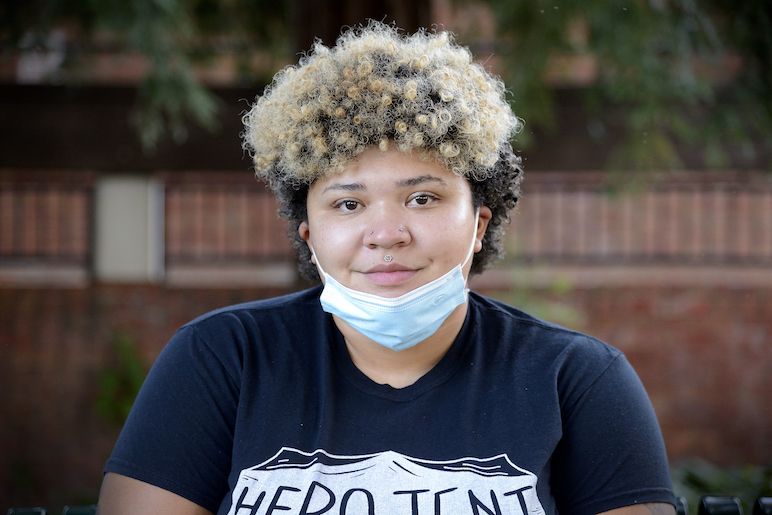
Kiana Simmons’ work to provide food and meals turned into a full blown operation of organizing and community support. Photo by Greg Ramar
It’s a controversial move, but Dimes does not shy away from controversy. He’s one of a handful of 20-something activists who—even as the national headlines that drove thousands to the streets have faded—is trying to ensure the fight for racial justice stays alive.
Dimes, who uses a pseudonym for fear of retaliation against his work, says the lack of turnout now is, at times, infuriating.
“When George Floyd was killed, you couldn’t go to the club, your favorite restaurants, you weren’t supposed to be hanging out with your friends,” he says. “By the time Demetrius Stanley was killed, it felt like people were back to their normal lives. The American attention span ain’t that long.”
‘The Government We Deserve’
As the crowd begins to disperse after the march for Stanley, a small subset of protesters light an American flag—one with a blue stripe symbolizing police support—on fire, and place it in the middle of Mission Street, right in front of San Jose Police Department headquarters.
Both HERO Tent and BLACK Outreach have received criticism for what some call extreme tactics. Organizers have placed raw hot dogs atop the fence that surrounds SJPD, actively refer to police as “pigs” and carry a fake, makeshift guillotine in the back of the HERO Truck.
“I understand why it’s off-putting,” says Dimes, who was elected president to what was then called Black Lives Matter San Jose in July of 2020. “I can’t shoot at the police, so I have to use imagery.”
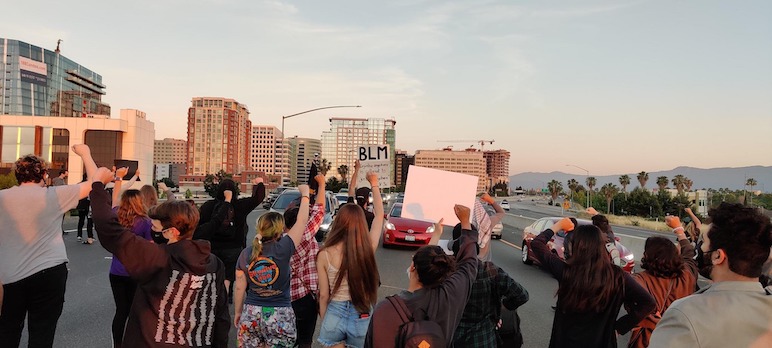
The HERO Truck led protesters down San Pedro Street and Highway 87, less than 24 hours after Demetrius Stanley, was killed by an undercover San Jose Police Officer. Photo courtesy of Ethan Gregory Dodge
Pamela Emanuel, VP of BLACK Outreach—which stands for “Black Liberation And Collective Knowledge,”—believes that their methods utilize “art and symbolism,” which can “spark voices that haven’t been ignited yet.”
“What [the police] do is far worse than our metaphors,” Emanuel, 24, says. “If they’re scared by that, then they should imagine how scared we are about the decisions they put in place that affect everyone’s lives on a daily basis.”
Dr. Harry Edwards, professor emeritus of Sociology at the University of California Berkeley and a former member of the Black Panther Party, draws parallels between these San Jose groups and Bobby Seale and Huey P. Newton, the co-founders of the Black Panther Party.
“At the end of the day, these acts of radicalization are in response to acts of violence from the police,” Edwards says. “The next time the mayor or police want to criticize these young folks, they need to ask themselves, ‘When was the last time you invited them to a seat at the table? When was the last time you put your gun down or took your political hat off and just talked with them in the community with the people they are serving?’ If you can’t answer that question, then don’t criticize them.”
Simmons points out that most of these decisions and community engagement have been made by the ones still “doing the work,” who are primarily people of color—the ones who literally have skin in the game.
Yet, Dimes says he remains outspoken because he believes the city won’t change until even more diverse voices are represented. In the 2018 mayoral election, roughly 15 percent of San Jose’s population at the time voted; a 2012 U.S. Census survey reported the city’s residents are 33.2% Hispanic, 32.8% Asian, 27.6% white, 2.8% African American and 3.6% other.
“Every country has the government it deserves—or, in this case, city,” Dimes says, paraphrasing French philosopher Joseph de Maistre. “We have the potential to have the power, because 70% of this city is [people of color]. The power is up for grabs, but people aren’t actively doing that. And until the people take that power, ain’t nothing going to change.”
Feeding the Block
Organizers like Dimes and Emanuel didn’t end up at the forefront of the South Bay’s activist groups by accident; their leadership and desire for change was born out of lived experiences growing up, primarily shaped by negative interactions with law enforcement and a lack of social stability at home.
Dimes was born in Berkeley, but lived and moved around with his mother—from North Carolina and Detroit to Pennsylvania and Italy—after his parents divorced when he was young. But after Dimes’ mom fell sick and wasn’t able to work, Child Protective Services started visiting, with the police.
“They would try to get me to say things like my mom’s not fit to take care of me,” Dimes said, recalling the anxiety he felt as a 16-year-old.
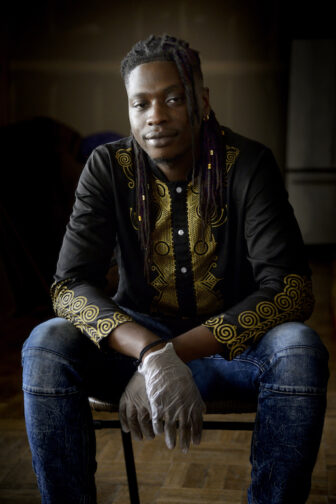
Lou Dimes is one of several young activists working for social change in San Jose, from within the halls of Grace Baptist Church to out on downtown’s streets. Photo by Greg Ramar
By his junior year in high school, he and his mother did not have a house to live in and were either living in their car or hotel rooms. When he got to school the first day, he was told he didn’t go there anymore and had to go to a state remedial school, where he became a ward of the state of Michigan.
After Dimes spent hours at a police station in handcuffs, he was sent to a juvenile center because authorities weren’t able to find a foster home for him.
“They just left me there for four-and-a-half months,” Dimes says. “[The CPS agent] said she was going to come back in two to three days, but she just left me. My only crime was being a homeless teenager.”
After months in the juvenile center, then months more in independent supervised living in a house owned by the state, he was able to work himself out on the condition that he would move in with his aunt in East Palo Alto and finish high school there. However, upon turning 18, his aunt wanted to rent his room out and he couldn’t afford it. Dimes once again became homeless, bouncing between various friends’ houses, hotels and jobs, even becoming a regular on Valley Transit Authority’s “Hotel 22” bus—the only 24-hour route.
Despite the hardships, Dimes’ time in juvenile detention and experience being unhoused informed one of his favorite programs organized by BLACK Outreach.
Every Saturday morning, dozens of volunteers occupy space at Grace Baptist Church, only blocks away from San Jose City Hall. While a handful of people prepare hot breakfast foods in the kitchen, the remaining helping hands are in the old gymnasium, surrounded by tall yellow walls adorned with biblical banners as assembly lines package the meal kits that will be distributed to anyone who needs one downtown.
One idea originated from Dimes’ time in juvenile detention. He says that once their food portions were halved by correctional staff, the youth would sneak off with saltines and cheese sticks they earned from good behavior to share between everyone in a shared cell—what they called “feeding the block.”
The idea eventually put Dimes in a six-by-six foot room, which he compares to solitary confinement, complete with a single bench and transparent doors—the opposite consequence of the community the idea has built in San Jose.
Shaped by History
In Emanuel’s mind, “the ones most impacted by this movement should be the ones leading it.” Having seen police brutality and the negative effects of the current system firsthand, she has taken that belief to heart.
Before Emanuel was born, her mother’s cousin was killed by police. She was taught not to call or trust the police, wary that someone else’s life could be lost. But, as the first daughter of a father who was extremely toxic and abusive in “pretty much every way you can imagine,” she couldn’t always heed that guidance.
“There were definitely times where I did call the police,” Emanuel says. “The last time I did, they didn’t knock. They just busted down the door and ended up breaking [my dad’s] arm.”
Her dad, who was raised by a pimp and later became a pimp himself, did not have a healthy attitude towards women. Emanuel remembers lurking outside of rooms listening in on her parents’ conversations, worried about her mom.
When she was 10 years old, her dad’s brother passed away while he was living with them. That same night, her dad moved out. Years later her brother was arrested and convicted, after his phone was determined to be present at the scene of a murder. Despite the fact that Emanuel’s entire family claims her brother was not present at the scene of the crime, he remains in prison today.
Already working two jobs, Emanuel’s mother couldn’t afford the legal fees, so she and two of her other sons turned to illegal means to pay. They, too, were arrested, convicted and imprisoned.
At 19, a rising college sophomore, with over half her family incarcerated, Emanuel found herself the legal guardian of her younger brother, her mother’s power of attorney and financially responsible for herself and her brother.

Whether making breakfast for “Feed the Block” events or working to become the breadwinner for her family, Pamela Emanuel knows what it takes to be all hands on deck. Photo by Greg Ramar
Emanuel worked 18-hour days that summer to make it all work, balancing an internship during the day with waiting tables at night. Eventually, she joined protests in Sacramento against the prison system, motivated by the poor living conditions inside the facilities; at the beginning of the pandemic, her mother was told to use her underwear as a mask.
Already an activist and organizer when George Floyd was killed—she was returning from a protest in Sacramento when she heard of his death—Emanuel knew she immediately wanted to get involved in the racial justice movement in her hometown.
“My family and what we have been through is an inspiration, [which can] really shape you to advocate for yourself,” Emanuel says. “Thankfully, I have a mom who has instilled in me to always stick up for myself and to always stick up for others when others cannot speak up for themselves. Also generational trauma that Black families experience day in and day out, that’s what really motivates me.”
Radical Optimism
Kiana Simmons, HERO Tent’s president and founder, can’t believe the difference when she compares May 2020 with now.
“[The number of] people has gone down so much,” Simmons recalled. “It’s very crazy to think of the numbers that we used to have last year, and just the type of engagement that we used to have.”
Simmons’ mother is white and her father is Black. Her father wasn’t a part of her life growing up in the northern California town of Eureka, meaning the now 23-year-old was the only person of color in her mom’s extended family for the first seven years of her life until her sister was born.
“Growing up with a white mother who didn’t understand how to take care of Black, textured hair, I didn’t really know what to do either,” Simmons recalled. “That would always be a conversation starter with the people in my class—I couldn’t exist in myself or in my body without it being pointed out to me that it was different.”
As a result, Simmons says she almost always wanted her hair straight as a child. Starting just this past year, she has learned to love her hair, largely due to the Black women she follows on social media who share their stories.
Simmons moved to the San Jose area in the fall of 2017 after studying in Finland for a year; the election of Donald Trump had already triggered “a political awakening” within her.
During her time as an activist on the streets, she noticed a lot of people needed food and water. The amount of support and donations that followed was massive, eventually allowing her to buy a red canopy to set up the operation, complete with volunteers at what became known as the “Red Tent.”
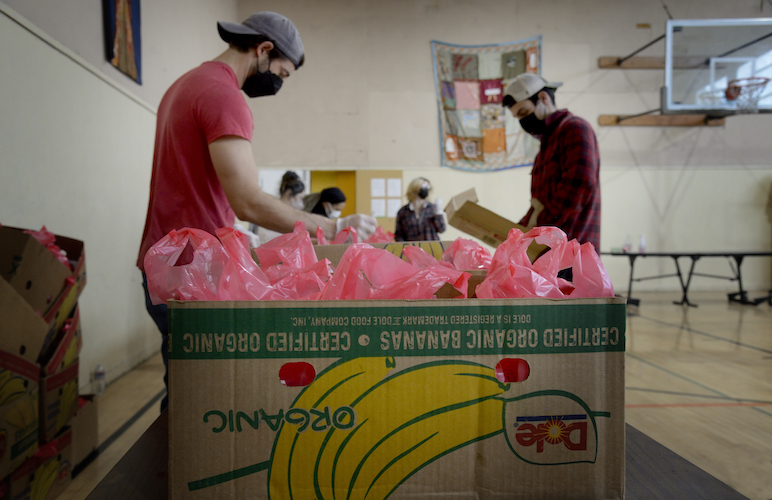
Volunteers assemble meals for “Feed the Block,” an event started by BLACK Outreach on Saturday mornings to help anyone in need. Photo by Greg Ramar
What started as an organic desire to help became a visual symbol to the community about the fight for racial justice in the South Bay—eventually dubbed the “HERO Tent,” standing for “human empowerment” and “radical optimism.”
Looking back at the time she’s worked with HERO Tent, Simmons says their work is inspired by people like the Black Panthers, even channeling the success of their 1970s zines into HERO Tent’s Instagram presence. But more than anything, these young adult activists are inspired by the people they are fighting for and fighting with, even as media coverage grows sparse and participation dwindles.
“The whole idea is that we’re optimistic that our society can do better,” Simmons says. “But there needs to be large amounts of systemic change to achieve that goal.”

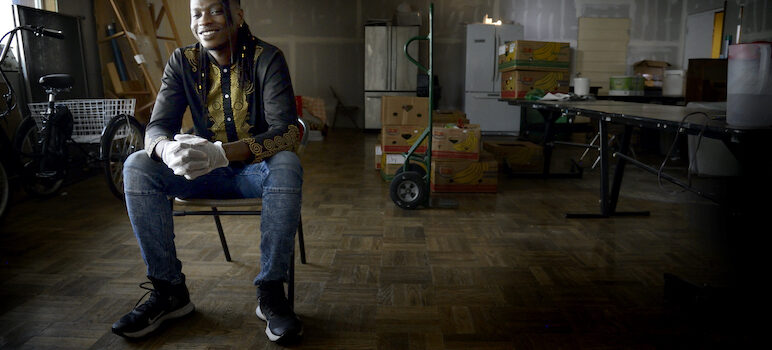
https://www.youtube.com/watch?v=ddbg3J_V0dY
This group represents the worst of the Leftist ideology, perpetuated by the misinformation they have received, then parrot to the rest of the misinformed to create misguided anger, fear and confusion. I also know this happens on the far right, too. Both extreme ends of the political, identity politics spectrum are exhausting the rest of the nation, and proof of that is in how Minnesota overwhelmingly said no to “defund the police” and the tactics this group promotes – then the elections in Virginia, New Jersey, South Carolina, etc.
People are tired of the woke mob, a smaller, but very loud, fringe element – attempting to censor speech they don’t like, because they are afraid to have actual discussions and debates. Proof is in the tactic of placing hot dogs near police stations – while ignoring the actual police data that shows the amount of officer involved deaths each year (about 1,000 in 2020, 45% were white people killed by cops) pales in comparison to the amount of people killed in inner cities each year.
It’s just confusing. It’s not everyone elses fault that some people don’t have a strong family connection, or their father was a pimp – these are circumstances of family culture and not systemic inequality. It’s time to stop scapegoating, and start taking accountability. Then, you’re addressing root causes.
Inspiring stuff.
Same old same recycled Marxist, black liberation theology ?.
There are plenty of countries (Venezuela, Cuba, and many countries in Africa) that one could go to if one were to feel uncomfortable in the US.
My advice to people who hate America is to solve the problem by renouncing their US citizenship and moving to a country that you like better.